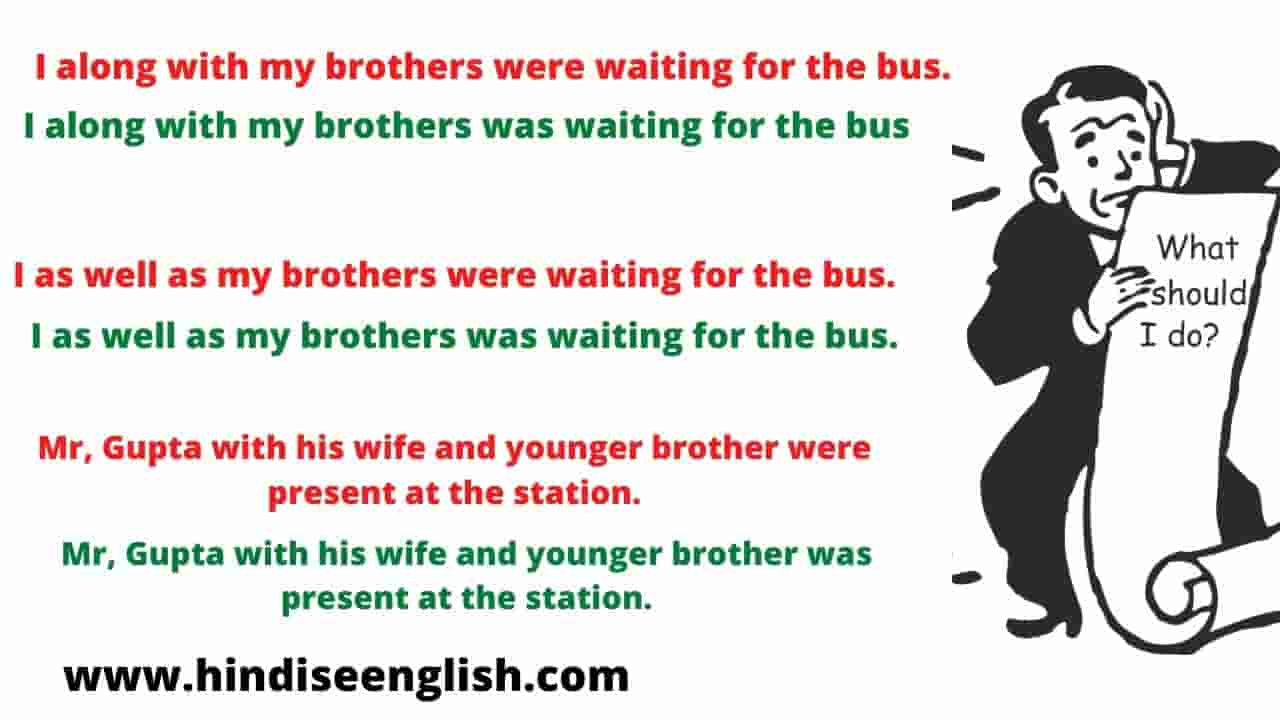

All of us know the importance of the rules of subject verb agreement without knowing its rule lots of difficulties have to be faced. Therefore, I’ve tried to draw your attention to it. Mainly, in this blog, we’ll focus on all The Rules Of Subject Verb Agreement and I’ll give you its exercise to practise the concept of it and I guarantee you right after mastering them, you’ll never make any mistakes onwards.

Note: There are some abbreviated forms of some English terms that will be used right below therefore, let’s be aware of:
S.S. – Singular Subject; P.S. – Plural Subject; S.V. – Singular Verb; P.V. – Plural Verb; P.D. – Positive Degree
V1, V5, V2, be, am, is, are, was, were, has, have, had.
Note: Subject के Person और Number के अनुसार Finite Verb का Person और Number निश्चित होता है।

1. यदि वाक्य में Singular Subject हो, तो Singular Verb प्रयोग किया जाता है।
2. यदि वाक्य में Plural Subject हो, तो Plural Verb का प्रयोग किया जाता है।
3. Singular Verbs: V5, does, is, has, was [इन पाँचों Verbs का प्रयोग (3rd Person + Singular Subjects) के साथ किया जाता है।]
4. Plural Verbs: V1, do, are, have, were [इन पाँचों Verbs का प्रयोग (3rd Person + Plural Subjects) के साथ किया जाता है। इसके अतिरिक्त, इन पाँचों Verbs का प्रयोग We और You के साथ किया जाता है।
5. 3rd Person + Singular Subjects: He, She, It, Ram, The boy, The cow, The machine, etc.
6. 3rd Person + Plural Subjects: They, Ram and Shyam, Boys, Cows, Machines, etc.
7. I के साथ V1, am, is, are, was, were, do, have, etc. का प्रयोग किया जाता है।
Ex-
59. Deer, 60. Sheep, 61. Swine, 62. The whereabouts, 63.
India, 64. The Ganges, 65. The jury, 66. The association of
lawyers, 67. Two and two, etc.
69. The electorate, 70. The peasantry, 71. The gentry, 72.The poultry, 74. The cattle, 75. The + Adjective (without Noun), People, etc.
77. Many a + Sin. Cou. N-S.S.
78. Many + Pl. Cou. N-P.S.
79. AII (Unc. N की ओर संकेत करने वाला) – S.S.
80. (All + Plural Common Noun) या (Cou. N की ओर संकेत करने वाला All) – P.S.
8I. More than one person – S.S.
82. More persons than one – P.S.
83. The president of the company and friend – S.S.
84. The president of the company and the friend – P.S.
85 Pond and fish (Two articles as a single unit) – S.S.
86. Ponds and fish – P.S.
87. Broad and butter (Livelihood /Two articles as a single unit)
Ex-(i) Bread and butter is the primary need of the poor,
(ii) Bread and butter is a nourishing food.
Note: Bread and butter – P.D.
Ex – Bread and butter are sold in this shop.
88. Tidings (खबरें /समाचार) – PS.
86. Singular Antecedent + who – S.V.
90. Plural Antecedent + who – P. V. (the boys – Antecedent )
91. Singular Antecedent + which S.V.
92. Plural Antecedent + which- .P.V.
93. Singular Antecedent + that – S.V
94. Plural Antecedent + that- P.V.
95. There + S.V. + Singular Complement
96. There + P.V. + Plural Complement
97. India (देश की ओर संकेत) – S.S.
EX- India is a vast country
98. India (देश के खिलाडियों की ओर संकेत) P.S. is
Ex – India are leading by 259 runs in the Test Cricket.
99. The rich man – S.S.
100. The rich/Riches – P.S.
101. The poor – S.S.
102. The poor/Poors P.S.
103. The policeman – S.S.
104. The police या Policemen — P.S.
105. Mathematics (Subject) -S.S.
The mathematics/ His mathematic – P.S.
106. The scissors – P.S.
107. A pair of scissors – S.S.
108. Electronics (Subject) – S.S.
109. The tongs (चिमटा) – P.S.
110. The news – S.S.
Note: Good news – S.S. या P.S.
111. The pincers (चिमटा/ संडासी) – P.S.
112. Rickets (Disease) (सुख का रोग) – S.S.
113. The trousers (Dress) – P.S.
114. Billiards (Game) – S.S.
115. The breeches (Dress) (पायजामा/पतलून) — P.S.
116.The three-fourths of the land – S.S
117. The pajamas (Dress) – P.S.
118. The tights (शरीर के निचले भाग के तंग कपड़े) – P.S.
119. A Cup and saucer (Two subjects as a single unit) – S.S.
120. A beautiful and intelligent girl – S.S.
121. A beautiful and an intelligent girl – P.S.
122. Soup and salad – S.S.
123. Politics – S.S.
124. Some ,many, most, few – P.S.
125. Brethren (Members of a society/ a community) – P.S.
126. The accounts officer and treasurer – S.S.
127. The accounts officer and the treasurer – P.S.
128. Every Tom,Dick and Harry – S.S (सामान्य व्यक्ति)
129. One of the boys – S.S.
130. Either of the two boys – S.S.
131. Neither of the two boys – S.S.
132. None of the three boys – S.S.
133. Any of the three boys – S.S.
134. Most of the wheat – S.S
135. Some of the wheat – S.S.
136. All of the wheat – S.S.
137. Everyone of them – S.S.
138. Each of the boys – S.S.
140. Each – S.N. – S.S.
141. Every + S.N. – S.S.
142. Each and every + S.N. – S.S.
143. Many – P.S
144. Few – P.S.
145. Most – P.S.
146. Most people — P.S.
147. Most of the people – P.S
148. Some of the people – P.S
149. A lot of books – P.S.
150 Lots of books – P.S.
Ex-(i) Two and two (a)/make (b)/ four. (c)/ No error (d)
(Equal -noun;verb)
(ii) Two and two is equa l to four.
(a) equals (b) equal to (c) equals to (d) No Imp.
(iii) The criminal’s where-abouts are not known to us.
(iv) The minister’s where-abouts is well known to us
(v) The jury have not decided yet.(अनेक मत/ मतों में अंतर है)
(vi) The jury has taken the decision unanimously. (एक मत है)
Second Subject यदि Singular Subject हो तो Singular Verb आएगा।
Second Subject यदि Plural Subject हो तो Plural Verb आएगा
Note: Plural subject can be placed only in the 2nd place.